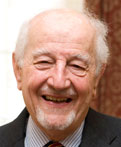Distinguished judges and scholars honor Guido Calabresi at the [I]Annual Survey[/I] dedication.
Distinguished judges and scholars honor Guido Calabresi at the Annual Survey dedication
 The 70th volume of the New York University Annual Survey of American Law was dedicated to a singular professor, dean, legal scholar, mentor, colleague, friend and judge, Guido Calabresi, senior judge of the U.S. Court of Appeals for the Second Circuit. Prior to President Bill Clinton appointing him to the bench in 1994, Calabresi was the dean and a professor at Yale Law School.
The 70th volume of the New York University Annual Survey of American Law was dedicated to a singular professor, dean, legal scholar, mentor, colleague, friend and judge, Guido Calabresi, senior judge of the U.S. Court of Appeals for the Second Circuit. Prior to President Bill Clinton appointing him to the bench in 1994, Calabresi was the dean and a professor at Yale Law School.
Those who spoke were NYU Law Dean Richard Revesz, NYU Law Professor Kenji Yoshino; Judge Robert Katzmann, also on the Second Circuit; University of Virginia Law Professor Kenneth S. Abraham; Yale Law Professor Akhil Reed Amar; and Judith Kaye ’62, former chief judge of the New York Court of Appeals, now a counsel at Skadden Arps. Their encomiums were warm, funny, and sometimes literary.
Revesz said Calabresi’s remarkable biography reminded him of Declan Walsh, protagonist in the 1979 novel, “Vicar of Christ,” who was a war hero, Supreme Court Justice, and ultimately became the pope. Noting the Vatican conclave assembled to determine a successor to Pope Benedict XVI, the famously quick-witted Calabresi said, “Should I be named, I shall be known as Ricky the First.”
Yoshino was not only a law student and later the first chairholder of the Guido Calabresi Professorship in Law, but he also clerked for Calabresi in 1996-97. They shared a fondness for classic literature. (Calabresi’s mother was Bianca Maria Finzi-Contini, scholar of European literature.) Yoshino said he sometimes related to the fictive commoner from Oxford who travels to Italy in service to the Marquis of Saluzzo—per “The Clerk’s Tale,” among the stories in Geoffrey Chaucer’s sprawling “The Canterbury Tales,” written in 14th-century Middle English. After all, said Yoshino, gesturing to his greatly amused former boss, “I served an Italian noble.”
Varano expanded on Calabresi’s devotion to all things Italian—save for the Fascist dictatorship under Benito Mussolini, which led to his family’s fleeing Milan for the United States. More than 40 years ago, when the then Yale professor was planning a sabbatical, Varano was responsible for arranging accommodations for the visiting Calabresi family. He located a house in the hills outside Florence. “This began Guido’s everlasting love of Tuscany,” said Varano. In fact, the Calabresis purchased a small grove near that Tuscan house. They return annually to harvest their trees for olive oil. Katzmann, who characterized his fellow jurist as a man with a “courtly manner” and “a brisk walk” is among those grateful for periodic gifts of Calabresi olive oil.
Nine years ago, Amar attended a birthday party at the Calabresi farm in Connecticut. Calabresi’s son, Massimo, told guests, “The thing about my dad is that he likes helping people. I bet he’s helped every person here.” At that moment, Amar recollected, “there was a barn full of bobbling heads.”
Abraham spoke of the “joyful noise of Guido Calabresi,” and of “Guidoisms” his many students will not soon forget. One such example, as reported in the blog Underneath Their Robes, involved an unusual pose that the “sprightly” torts professor would take: “One of Guido’s favorite classroom stunts is to leap up onto his desk, lie down on his side, and continue his lecture,” in approximation of “Une Odalisque,” an 1814 oil painting of a reclining French concubine. Students dubbed the pose, “Guidolisque.”
Calabresi’s cheerful accessibility to students—many of great accomplishment, including feminist legal scholar Catherine MacKinnon, former U.S. Attorney General Michael Mukasey, and Supreme Court Justices Sonia Sotomayor, Samuel Alito and Clarence Thomas—complements his serious scholarly side. Among his four books is the 1970 masterwork, The Cost of Accidents: a Legal and Economic Analysis. Among more than 100 law review articles is the still frequently cited “Property Rules, Liability Rules and Inalienability: One View of the Cathedral,” published in the Harvard Law Review in 1972.
But the event was mainly to honor the enormous humanity of Guido Calabresi. “The word that best captures your spirit is mensch,” Kaye told him. “Just plain mensch.”
Watch the full video of the event (1 h 34 min):
Posted March 1, 2013

